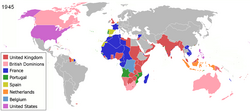Self-determination
The right of nations to self-determination (from German: [Selbstbestimmungsrecht der Völker] Error: {{Lang}}: text has italic markup (help)), or with less words, self-determination is the idea that nations have the right to choose their sovereignty (who or what rules them) and international political status without other countries telling them. Most of the world used to be ruled by empires (really big countries with more than one ethnic group, usually with one group having a lot of power over the others), and many of the countries that the empires ruled were considered colonies of the empire, but after The first World War (1914-1919), and especially the second World War (1929-1945), most of these empires collapsed (fell apart) and local populations (people living in the "colonies" native to the area) began to want independence and their country to be ruled by them, not someone very far away who they thought was mistreating them. Lots of nationalist movements arose in these countries, usually in Asia, Africa, and the Middle East, because people usually considered themselves as a separate group than the one who ruled them (for example, Arabs, not British, when the British Empire had ruled a lot of Arabia).
Some people who believe in self-determination use violence, others do not.
Self-determination Media
Moluccans in The Hague protesting Indonesia under Suharto's treatment of East Timor, calling for freedom for East Timor, Papua, Aceh and Maluku, 1986
Map of territorial changes in Europe after World War I (as of 1923)
Map of the world in 1945, showing United Nations Trusteeship Council territories in green
Western European colonial empires in Asia and Africa disintegrated after World War II
Changes in national boundaries after the end of the Cold War
Southern Sudanese expressed joy and jubilation on their day of independence, July 9, 2011, from Sudan.
Celebration of the Declaration of Independence of Kosovo in 2008
Donetsk status referendum organized by separatists in Ukraine. A line to enter a polling place, 11 May 2014
During the 2019–20 Hong Kong protests, calls rose for self-determination by Hongkongers.
- Artsakh Movement, February 13, 1988.jpg
The first major demonstration in Stepanakert on February 13, 1988. Traditionally considered the start of the Artsakh movement.

